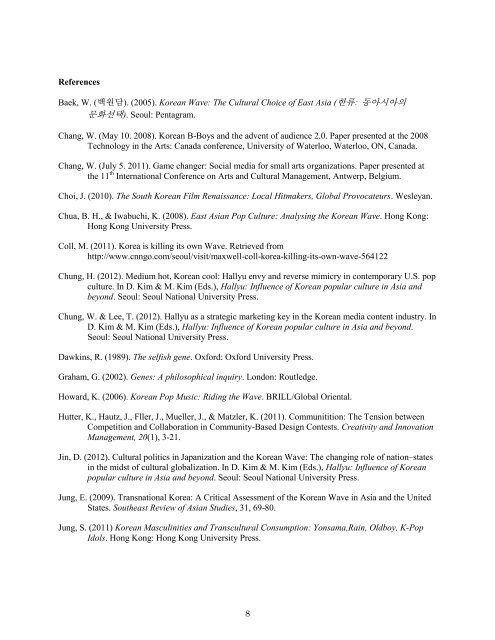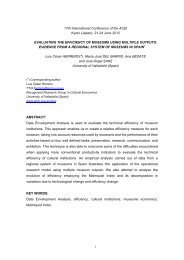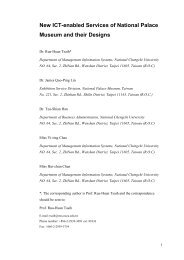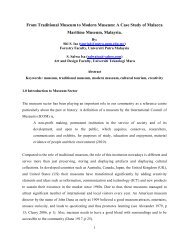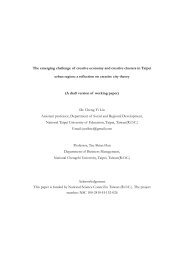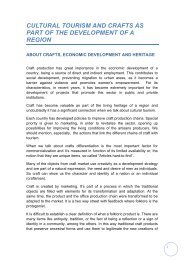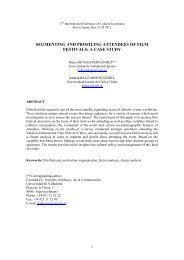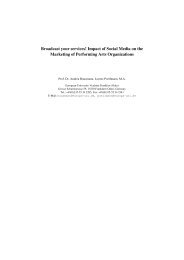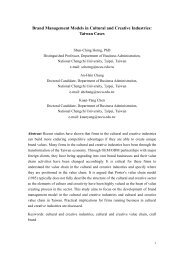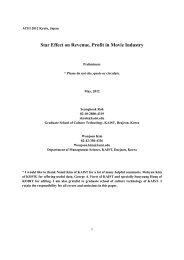The Korean Wave: Cultivating a Global Fandom by Shin-Eui Park ...
The Korean Wave: Cultivating a Global Fandom by Shin-Eui Park ...
The Korean Wave: Cultivating a Global Fandom by Shin-Eui Park ...
Create successful ePaper yourself
Turn your PDF publications into a flip-book with our unique Google optimized e-Paper software.
References<br />
Baek, W. (백원담). (2005). <strong>Korean</strong> <strong>Wave</strong>: <strong>The</strong> Cultural Choice of East Asia (한류: 동아시아의<br />
문화선택). Seoul: Pentagram.<br />
Chang, W. (May 10. 2008). <strong>Korean</strong> B-Boys and the advent of audience 2.0. Paper presented at the 2008<br />
Technology in the Arts: Canada conference, University of Waterloo, Waterloo, ON, Canada.<br />
Chang, W. (July 5. 2011). Game changer: Social media for small arts organizations. Paper presented at<br />
the 11 th International Conference on Arts and Cultural Management, Antwerp, Belgium.<br />
Choi, J. (2010). <strong>The</strong> South <strong>Korean</strong> Film Renaissance: Local Hitmakers, <strong>Global</strong> Provocateurs. Wesleyan.<br />
Chua, B. H., & Iwabuchi, K. (2008). East Asian Pop Culture: Analysing the <strong>Korean</strong> <strong>Wave</strong>. Hong Kong:<br />
Hong Kong University Press.<br />
Coll, M. (2011). Korea is killing its own <strong>Wave</strong>. Retrieved from<br />
http://www.cnngo.com/seoul/visit/maxwell-coll-korea-killing-its-own-wave-564122<br />
Chung, H. (2012). Medium hot, <strong>Korean</strong> cool: Hallyu envy and reverse mimicry in contemporary U.S. pop<br />
culture. In D. Kim & M. Kim (Eds.), Hallyu: Influence of <strong>Korean</strong> popular culture in Asia and<br />
beyond. Seoul: Seoul National University Press.<br />
Chung, W. & Lee, T. (2012). Hallyu as a strategic marketing key in the <strong>Korean</strong> media content industry. In<br />
D. Kim & M. Kim (Eds.), Hallyu: Influence of <strong>Korean</strong> popular culture in Asia and beyond.<br />
Seoul: Seoul National University Press.<br />
Dawkins, R. (1989). <strong>The</strong> selfish gene. Oxford: Oxford University Press.<br />
Graham, G. (2002). Genes: A philosophical inquiry. London: Routledge.<br />
Howard, K. (2006). <strong>Korean</strong> Pop Music: Riding the <strong>Wave</strong>. BRILL/<strong>Global</strong> Oriental.<br />
Hutter, K., Hautz, J., Fller, J., Mueller, J., & Matzler, K. (2011). Communitition: <strong>The</strong> Tension between<br />
Competition and Collaboration in Community-Based Design Contests. Creativity and Innovation<br />
Management, 20(1), 3-21.<br />
Jin, D. (2012). Cultural politics in Japanization and the <strong>Korean</strong> <strong>Wave</strong>: <strong>The</strong> changing role of nation–states<br />
in the midst of cultural globalization. In D. Kim & M. Kim (Eds.), Hallyu: Influence of <strong>Korean</strong><br />
popular culture in Asia and beyond. Seoul: Seoul National University Press.<br />
Jung, E. (2009). Transnational Korea: A Critical Assessment of the <strong>Korean</strong> <strong>Wave</strong> in Asia and the United<br />
States. Southeast Review of Asian Studies, 31, 69-80.<br />
Jung, S. (2011) <strong>Korean</strong> Masculinities and Transcultural Consumption: Yonsama,Rain, Oldboy, K-Pop<br />
Idols. Hong Kong: Hong Kong University Press.<br />
8


